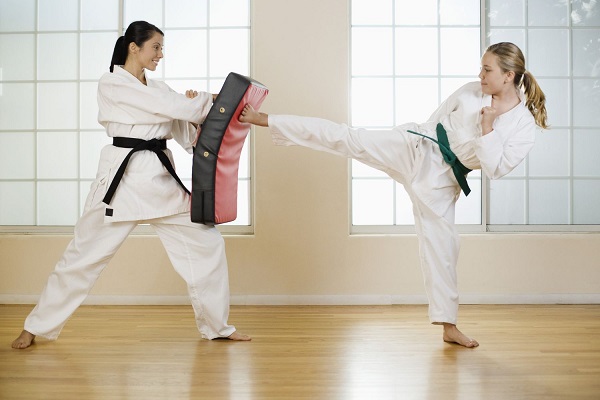In the pursuit of overall well-being, individuals are increasingly turning to holistic approaches that address both physical and mental health. One such avenue gaining popularity is the practice of martial arts. Beyond the kicks and punches, martial arts provides a unique blend of physical exercise, mental discipline, and emotional resilience. This article explores the interconnected benefits of martial arts on physical and mental health, highlighting the ways in which this ancient practice serves as a powerful tool for achieving balance in our hectic lives.
The Physical Benefits of Martial Arts
Cardiovascular Fitness
Engaging in martial arts requires continuous movement, making it an excellent cardiovascular workout. Whether it’s the high-intensity bursts of energy in kickboxing or the sustained endurance of Brazilian Jiu-Jitsu, martial arts elevate the heart rate, improving cardiovascular health and stamina. Martial arts training not only enhances overall fitness but also contributes to weight management and the prevention of cardiovascular diseases.
Strength and Flexibility
Martial arts involve a diverse range of movements that target various muscle groups. From the explosive power required for striking techniques to the core strength needed for grappling, practitioners develop both strength and flexibility. Consistent training gradually builds lean muscle mass, tones the body, and enhances overall physical strength, contributing to improved posture and reduced risk of injury.
Coordination and Motor Skills
The intricate choreography of martial arts forms and techniques enhances coordination and refines motor skills. Practitioners learn to move with precision and control, fostering a mind-body connection that extends beyond the training mat. Improved coordination not only contributes to better athletic performance but also carries over into daily activities, promoting a more agile and balanced lifestyle.
The Mental Benefits of Martial Arts
Stress Reduction and Mental Clarity
Martial arts training often involves focused and repetitive movements, creating a meditative experience that promotes stress reduction. The concentration required during practice allows individuals to momentarily disconnect from daily worries, fostering mental clarity and a sense of calm. This meditative aspect of martial arts contributes to improved mental well-being, helping practitioners manage stress more effectively.
Discipline and Self-Control
One of the fundamental principles of martial arts is discipline. Regular training instills a strong sense of self-discipline and self-control, essential attributes that extend beyond the training environment. Learning to control one’s body and emotions not only enhances the effectiveness of martial arts techniques but also cultivates a disciplined mindset that can be applied to various aspects of life.
Boosted Confidence and Self-Esteem
As individuals progress in their martial arts journey, they overcome challenges, master new techniques, and witness personal growth. These achievements contribute to increased confidence and self-esteem. Martial arts is not just about physical prowess; it’s about recognizing and harnessing one’s inner strength, fostering a positive self-image that can have profound effects on mental health.
The Holistic Connection
Mindfulness and Presence
Martial arts is a practice that demands mindfulness – the ability to be fully present in the moment. Whether executing a complex sequence or engaging in sparring, practitioners learn to focus their attention on the task at hand. This mindfulness not only enhances the effectiveness of martial arts techniques but also spills over into everyday life, promoting a heightened awareness of thoughts, feelings, and actions.
Emotional Resilience and Conflict Resolution
Through controlled sparring and self-defense training, martial arts instill emotional resilience and the ability to navigate conflict. Practitioners learn to manage fear, frustration, and aggression, transforming these emotions into controlled and strategic responses. This emotional intelligence not only contributes to a more harmonious training environment but also equips individuals with valuable tools for resolving conflicts in their personal and professional lives.
Choosing the Right Martial Art for You
Personal Preferences and Fitness Goals
With a multitude of martial arts styles available, individuals can choose the one that aligns with their personal preferences and fitness goals. Whether it’s the striking techniques of Muay Thai, the fluid movements of Tai Chi, or the ground-based strategies of Judo, each martial art offers unique physical and mental benefits. Exploring different styles allows individuals to find the one that resonates most with them.
Incorporating Martial Arts into Daily Life
The key to reaping the full benefits of martial arts for physical and mental health lies in consistency and integration into daily life. Regular practice, combined with a healthy lifestyle, nutrition, and proper rest, maximizes the positive impact of martial arts on overall well-being. Many practitioners find that the discipline cultivated in martial arts spills over into other areas of life, creating a ripple effect of positive habits.
Conclusion
Martial arts is a dynamic and multifaceted practice that transcends the boundaries of physical exercise. It serves as a holistic tool for achieving balance in an individual’s life, addressing both physical and mental health. The cardiovascular benefits, strength development, and improved coordination contribute to enhanced physical well-being, while the mental aspects of stress reduction, discipline, and emotional resilience foster a sound and resilient mind.
